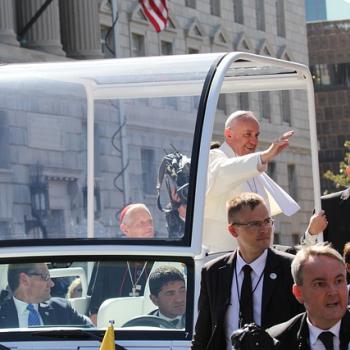 Last night as I went through the nightly ritual of blessing my daughters before sleep, I paused for several seconds with my cheek against the forehead of one of them. I love smelling their skin, their hair -- and these moments of quiet, when they are less apt to be running off to put on a play or shoot a basketball allow me simply to draw sensory memories from their presence.
Last night as I went through the nightly ritual of blessing my daughters before sleep, I paused for several seconds with my cheek against the forehead of one of them. I love smelling their skin, their hair -- and these moments of quiet, when they are less apt to be running off to put on a play or shoot a basketball allow me simply to draw sensory memories from their presence.
I was simply watching her eyelids blink, pensively. I was struck once again at how beautiful her eyes are. Chinese eyes, I reminded myself, though most days I am scarcely aware of that difference from my own. Most days I forget that people perceive a racial difference between us; most days, she is just my daughter, whom I love deeply and mysteriously. Parents of children adopted from China talk about the "red thread" that connects parents to children even before they are adopted; I imagine now, eight and a half years after we brought her home for the first time, that the thread has become braided and intertwined, like a Gordian knot. Nothing will unmake her my child; nothing will unmake me her father.
I remember when my wife Sue and I were discussing adoption for the first time. I was hesitant; I had imbibed all the cultural messages about bloodline and so on, and was uneasy about the idea. It was the stark, violent, life-sucking experience of infertility that forced our hand: adoption, or no children at all, and over time it became clear that this was the direction we would pursue. The machinations of conventional wisdom made me think adoption would be a second-best option, a plan B. I was selfish then (I thank God Sue was not) -- I could not get past what I wanted (or did I think it was what we wanted?) and consider the bigger picture.
The bigger picture now is, of course, clear: millions of children are waiting for parents, even as many young couples throw thousands of dollars at medical technologies designed to overcome the biological odds. I understand, of course -- we went part way down that road, only to realize that there were some options open to us that pointed our moral compass askew.
That moral compass has been formed by our lifetimes as practicing Catholics. During our struggles with infertility, I was fresh out of a Ph.D. program in Catholic systematic theology, and in fact was teaching courses on bioethics. I knew the tradition; I knew the theology. And yet Sue and I wrestled with deeply personal questions: why doesn't God want us to have a child? The biblical narratives so often focused on children as answers to prayer or divine intervention: Sarah, Hannah, Rachel, Mary, Elizabeth. Were we unworthy? Unfaithful? And yet we were also aware of the biblical emphasis on caring for widows and orphans; it was bringing those ideas into prayer that helped form a desire for adoption.
In retrospect, it is easy to see how the trauma of infertility was mostly about letting go of false hopes in order to make way for newer, more life-giving ones. Letting go of hope is hard. I tend to think, though, that was our shared spirituality, rooted in a story of torture, death, and ultimately resurrection, that allowed us to see the possibility of hope even when we couldn't feel it.
Adoption can be a hard road: we know families that do experience problems unique to the experience of adoption, and we ourselves are constantly learning to navigate our own challenges. What sustains us -- aside from the obvious daily joy of our family life -- is the conviction that what we are doing is trying to listen carefully to a God who has invited us in love to do something beautiful for each other. It can be a hard-earned beauty, the kind that stays awake at night because of a child's fears, or confronts the real struggles facing adopted children and interracial families. But I think that it is precisely the struggles which, in the end, make the experience meaningful.
What does it mean to parent an adopted child? On the face of it, nothing different from any other kind of vocation: to spend oneself in love. But every now and again, as last night watching my daughter's eyes, I am surprised by it.
Tim Muldoon's next book is a memoir entitled Longing to Love (Loyola Press, Spring 2010).
8/11/2009 4:00:00 AM




